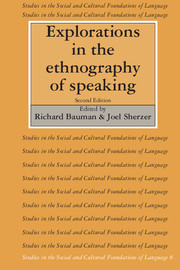Book contents
- Frontmatter
- Contents
- INTRODUCTION TO THE SECOND EDITION
- I PREFACE AND INTRODUCTION
- II COMMUNITIES AND RESOURCES FOR PERFORMANCE
- III COMMUNITY GROUND RULES FOR PERFORMANCE
- IV SPEECH ACTS, EVENTS, AND SITUATIONS
- V THE SHAPING OF ARTISTIC STRUCTURES IN PERFORMANCE
- VI TOWARD AN ETHNOLOGY OF SPEAKING
- Introduction
- 19 Data and Data Use in an Analysis of Communicative Events
- 20 The Ethnography of Writing
- 21 Ways of Speaking
- Notes
- References
- Index of names
20 - The Ethnography of Writing
Published online by Cambridge University Press: 05 June 2012
- Frontmatter
- Contents
- INTRODUCTION TO THE SECOND EDITION
- I PREFACE AND INTRODUCTION
- II COMMUNITIES AND RESOURCES FOR PERFORMANCE
- III COMMUNITY GROUND RULES FOR PERFORMANCE
- IV SPEECH ACTS, EVENTS, AND SITUATIONS
- V THE SHAPING OF ARTISTIC STRUCTURES IN PERFORMANCE
- VI TOWARD AN ETHNOLOGY OF SPEAKING
- Introduction
- 19 Data and Data Use in an Analysis of Communicative Events
- 20 The Ethnography of Writing
- 21 Ways of Speaking
- Notes
- References
- Index of names
Summary
The study of writing systems has had a long history within the discipline of anthropology and opinions concerning its importance, as well as the kinds of theoretical problems to which it should properly address itself, have exhibited considerable diversity. Nineteenth-century evolutionists seized upon the presence or absence of writing as typological criteria which, when used to define different levels of cultural development, served handily to distinguish ‘civilization’ from its antecedent stages (cf. Bastian 1860; Maine 1873; McClennan 1876; Tylor 1865). Shortly before 1900, interest shifted to the history of writing itself, and in the years that followed a number of unilinear schemes were propounded which purported to trace the evolution of graphic communication from its simplest forms to the appearance of full-blown alphabets (e.g., Cohen 1958; Diringer 1949, 1962; Fevrier 1948; Gelb 1963; Mallory 1886, 1893; Moorhouse 1953). In the 1930s and 40s, by which time American anthropologists had turned their attention to other issues, writing systems figured prominently in discussions of stimulus diffusion, independent invention, internal patterning, and the acceptance, rejection, and modification of diffused cultural traits (cf. Kroeber 1948). During the same period, however, the study of writing began to suffer at the hands of linguists. Depicted by members of the emergent structural school as a pale and impoverished reflection of language, writing was consigned to a position of decidedly minor importance.
- Type
- Chapter
- Information
- Explorations in the Ethnography of Speaking , pp. 425 - 432Publisher: Cambridge University PressPrint publication year: 1989
- 19
- Cited by



